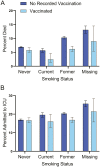Smoking Status, Nicotine Medication, Vaccination, and COVID-19 Hospital Outcomes: Findings from the COVID EHR Cohort at the University of Wisconsin (CEC-UW) Study
- PMID: 36069915
- PMCID: PMC9494410
- DOI: 10.1093/ntr/ntac201
Smoking Status, Nicotine Medication, Vaccination, and COVID-19 Hospital Outcomes: Findings from the COVID EHR Cohort at the University of Wisconsin (CEC-UW) Study
Abstract
Introduction: Available evidence is mixed concerning associations between smoking status and COVID-19 clinical outcomes. Effects of nicotine replacement therapy (NRT) and vaccination status on COVID-19 outcomes in smokers are unknown.
Methods: Electronic health record data from 104 590 COVID-19 patients hospitalized February 1, 2020 to September 30, 2021 in 21 U.S. health systems were analyzed to assess associations of smoking status, in-hospital NRT prescription, and vaccination status with in-hospital death and ICU admission.
Results: Current (n = 7764) and never smokers (n = 57 454) did not differ on outcomes after adjustment for age, sex, race, ethnicity, insurance, body mass index, and comorbidities. Former (vs never) smokers (n = 33 101) had higher adjusted odds of death (aOR, 1.11; 95% CI, 1.06-1.17) and ICU admission (aOR, 1.07; 95% CI, 1.04-1.11). Among current smokers, NRT prescription was associated with reduced mortality (aOR, 0.64; 95% CI, 0.50-0.82). Vaccination effects were significantly moderated by smoking status; vaccination was more strongly associated with reduced mortality among current (aOR, 0.29; 95% CI, 0.16-0.66) and former smokers (aOR, 0.47; 95% CI, 0.39-0.57) than for never smokers (aOR, 0.67; 95% CI, 0.57, 0.79). Vaccination was associated with reduced ICU admission more strongly among former (aOR, 0.74; 95% CI, 0.66-0.83) than never smokers (aOR, 0.87; 95% CI, 0.79-0.97).
Conclusions: Former but not current smokers hospitalized with COVID-19 are at higher risk for severe outcomes. SARS-CoV-2 vaccination is associated with better hospital outcomes in COVID-19 patients, especially current and former smokers. NRT during COVID-19 hospitalization may reduce mortality for current smokers.
Implications: Prior findings regarding associations between smoking and severe COVID-19 disease outcomes have been inconsistent. This large cohort study suggests potential beneficial effects of nicotine replacement therapy on COVID-19 outcomes in current smokers and outsized benefits of SARS-CoV-2 vaccination in current and former smokers. Such findings may influence clinical practice and prevention efforts and motivate additional research that explores mechanisms for these effects.
© The Author(s) 2022. Published by Oxford University Press on behalf of the Society for Research on Nicotine and Tobacco.
Conflict of interest statement
Figures
References
-
- Centers for Disease Control and Prevention. CDC COVID Data Tracker. 2022. https://covid.cdc.gov/covid-data-tracker/#datatracker-home. Accessed June 29, 2022.
-
- Arcavi L, Benowitz NL.. Cigarette smoking and infection. Arch Intern Med. 2004;164(20):2206–2216. - PubMed
-
- U.S. Department of Health and Human Services. The Health Consequences of Smoking: 50 Years of Progress. A Report of the Surgeon General. Atlanta, GA: U.S. Department of Health and Human Services, Centers for Disease Control and Prevention, National Center for Chronic Disease Prevention and Health Promotion, Office on Smoking and Health; 2014.
-
- World Health Organization. Smoking and COVID-19: Scientific Brief, 30 June 2020 (No. WHO/2019-nCoV/Sci_Brief/Smoking/2020.2). World Health Organization; 2020.
Publication types
MeSH terms
Substances
Grants and funding
LinkOut - more resources
Full Text Sources
Medical
Miscellaneous


